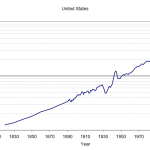America’s Demise Greatly Exaggerated
Over at New Atlanticist, I have a new post up entitled, “America’s Coming Decline?”
Contra Arnaud de Borchgrave, Thomas Friedman, and others, I argue that it is highly unlikely that China, Europe, or anyone else overtakes the United States as the major economic player in the world.
The bottom line is that the current financial “crisis” is almost certainly a short term blip and that the United States is quite likely to continue our two hundred year trend of increasing real GDP per capita.







James, I tend to agree with you on both substantive points.
However, I do tend to think that the effects of the current liquidity crunch will be palpable for the next couple of years…what do you think?
Plus, of course, we will be paying for the feckless outpouring of bailout money for decades, but I giess I can work until I’m 80 or so.
There will no doubt be short-term effects. Two years sounds more than plausible. I just doubt the sky-is-falling comparable-to-the-Great-Depression talk. McCain actually got it right before he got it wrong: the foundations of the economy are strong.
Okay, but going from that to, “America will now go into persistant decline” is a bit silly, no?
People tend to over-emphasize the short term, ignore historical data, and often make other sorts of errors in processing data. That and gloom-n-doom sells like f*cking hot cakes. Write a book that America will be fine and it will wind up in the bargin bin ASAP. Write a book that the U.S. is going to be worse off than Bangladesh and you’ll be on Opra’s couch ASAP.
I think there’s no way to assess what the impact of the financial crisis will be on the larger economy. As Steve notes below, we’re not really seeing much at this point. It could be a little; it could be a lot.
Some marginal organizations are going to feel the pinch severely and there may be governments included among them, local, maybe state, maybe foreign.
There will also be other, broader effects. During the 90’s getting into technology and technology support looked like a really smart move; now maybe not so much. There are thousands of people who worked in technology then who never will again. There just are not enough jobs.
During the 00’s the financial sector looked very attractive. That sector, too, is going to contract to a more realistic level and a lot of people who’ve worked in the sector for years will never work in it again.
I also think that the next few months may be a wakeup call for the rest of the world.
Until Americans feel more secure about the future I suspect they’ll be reluctant to spend money even if they have it. We’re already seeing that in the auto sector: GM, Ford, and Chrysler are all seeing 30% lower sales than this time last year. Even Toyota is seeing a slowdown.
Slowing consumer spending is going to hit countries that are dependent on U. S. consumer spending hard. I’ve been complaining that China needs to develop its own domestic market for years. If China slides into a funk, it’ll be the proof of that.
James,
Europe and China can overtake America without our growth going negative, or even slowing. It seems to me you’re mixing two very different arguments here.
Michael, China’s demographics suggest that their overtaking us is extremely unlikely. For Europe to overtake us they’d have to grow faster than we do for a protracted period. To do that they’d have to grow and they’ve got problems of their own which they’re in no way as far down the track to dealing with as we are.
I agree, and I wasn’t trying to say that James was wrong, just that he can’t use American’s growth alone as evidence that we won’t be overtaken.
It must be great to view the great depression as a short term blip on long term trends that did not make any difference in the long run.
Obviously, you did not live through it.
Nobody’s denying that the Great Depression involved enormous pain in the short and medium term for lots of people. My strong guess is that the current crisis will be far, far less impactful.
Regardless, however, that has nothing to do with the argument at hand. The depression of the late 1920s and 1930s was global and the United States grew relative to other economies during that period.